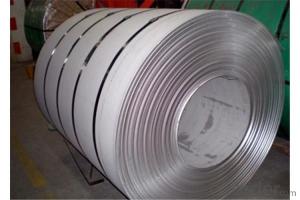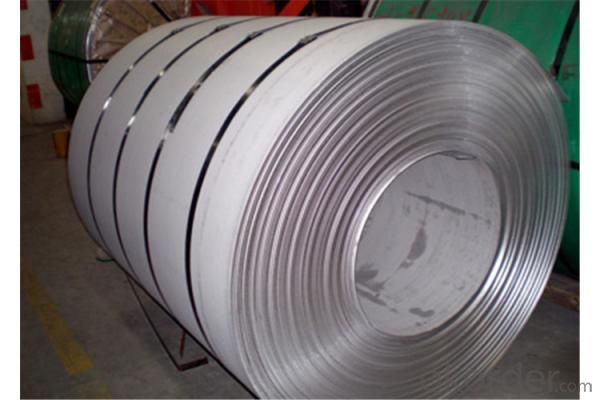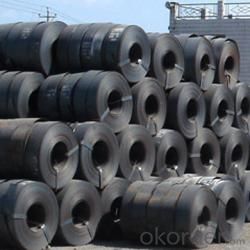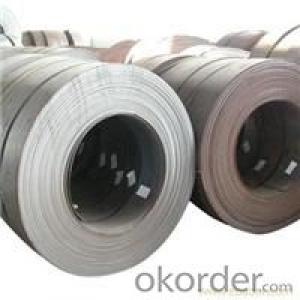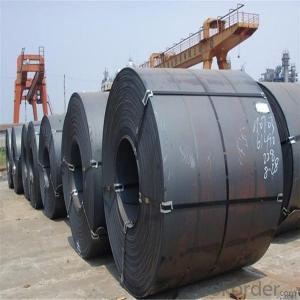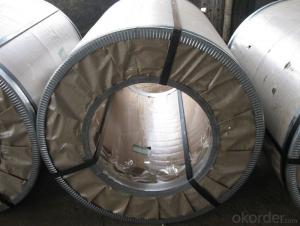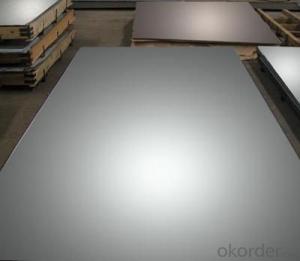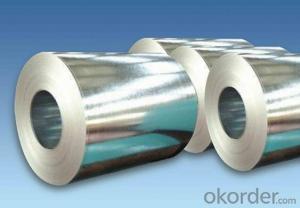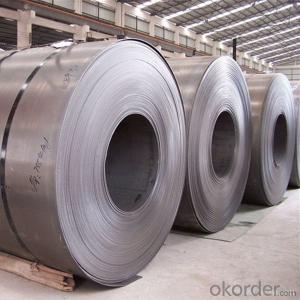hot rolled steel coil carbon steel coil with competetive price
- Loading Port:
- Tianjin
- Payment Terms:
- TT OR LC
- Min Order Qty:
- 500 m.t.
- Supply Capability:
- 10000 m.t./month
OKorder Service Pledge
OKorder Financial Service
You Might Also Like
Quick Details
Standard: GB, JIS
Grade: SS400/Q235B
Thickness: 0.5-8
Place of Origin: Hebei, China (Mainland)
- Type: Steel Coil
Technique: Hot Rolled
Surface Treatment: Other
Application: Flange Plate
Width: 1250-2500
Length: 2M-6M
Steel Grade: SS400
Packaging & Delivery
| Packaging Details: | as customs require, or in bundles |
|---|---|
| Delivery Detail: | 25 days after receiving the deposit |
Specifications
Material: SS400
Thickness: 2.0-12mm
Length: 2438, 6000, 9000mm or as required.
SS400 11.5*1500
SS400 11.5*2000
SS400 2.0*1500
SS400 2.3*1500
SS400 2.5*1500
SS400 2.5*1800
SS400 2.75*1500
SS400 3.0*1500
SS400 3.5*1500
SS400 3.75*1500
SS400 4.0*1500
SS400 4.3*1500
SS400 4.5*1500
SS400 4.7*1500
SS400 4.75*1500
SS400 5.5*1500
SS400 5.7*1500
SS400 5.75*1500
SS400 5.8*1500
SS400 7.3*1500
SS400 7.5*1500
SS400 7.75*1500
SS400 7.75*2000
SS400 9.3*1500
SS400 9.75*1500
SS400 9.75*2000
- Q: What are the different types of coil edge trimming machines?
- There are several types of coil edge trimming machines available in the market. Some common types include manual coil edge trimmers, pneumatic coil edge trimmers, and automatic coil edge trimmers. Manual coil edge trimmers require manual operation and are suitable for low volume production. Pneumatic coil edge trimmers use compressed air to power the trimming process, making them faster and more efficient. Automatic coil edge trimmers are fully automated machines that can handle high volume production, enhancing productivity and reducing labor requirements.
- Q: What are the different types of steel coil finishing machines?
- There are several different types of steel coil finishing machines, each designed to perform specific tasks and achieve desired results. Some common types include: 1. Slitting Machines: These machines are used to slit large steel coils into narrower strips of desired widths. They consist of a set of circular blades that cut through the coil as it passes through the machine, creating multiple smaller coils or strips. 2. Cut-to-Length Machines: These machines are used to cut steel coils into specific lengths. They can be programmed to make precise cuts at predetermined lengths, ensuring accuracy and consistency. 3. Recoiling Machines: Recoiling machines are used to rewind steel coils into tight, compact rolls. They are typically used to create smaller coils from larger ones or to rewound coils that have become loose or damaged. 4. Edging Machines: Edging machines are used to remove excess material from the edges of steel coils, improving their overall appearance and ensuring consistent width throughout the coil. 5. Coating Machines: These machines are used to apply various coatings or finishes to the surface of steel coils, such as paint, galvanized coatings, or protective films. They often incorporate drying or curing systems to ensure proper adhesion and durability of the applied coatings. 6. Packaging Machines: Packaging machines are used to wrap or package steel coils for transportation or storage. They can wrap the coils in protective materials, such as plastic or paper, and secure them with strapping or other fastening methods. 7. Inspection Machines: These machines are used to inspect the quality and integrity of steel coils. They can detect defects, such as cracks, scratches, or surface irregularities, and provide feedback for quality control purposes. These are just a few examples of the different types of steel coil finishing machines available. Each machine serves a specific purpose in the steel coil finishing process, ensuring that the final product meets the desired specifications and quality standards.
- Q: What are the different coil packaging methods used for steel coils?
- Steel coils can be packaged using various methods to guarantee their protection and secure transportation. These methods also help optimize storage space. Some of the commonly used packaging methods for steel coils are as follows: 1. Strapping: Metal or plastic straps are used to secure the steel coils. This ensures stability and prevents unrolling or shifting during transportation. Strapping is suitable for smaller coils or when other packaging methods are also utilized. 2. Stretch wrapping: Steel coils are tightly wrapped using a stretch film. This technique provides excellent protection against dust, moisture, and other contaminants. It also keeps the coils tightly bound and prevents movement during handling and transportation. 3. Steel banding: Steel bands or straps are employed to secure the coils. This packaging method offers superior strength and durability. It is ideal for larger and heavier steel coils that require additional reinforcement. 4. Wooden crating: Particularly large or heavy steel coils are packaged in wooden crates. These crates provide enhanced protection against impacts, moisture, and other external factors. Wooden crating is commonly used for long-distance transportation or when coils need to be stored for extended periods. 5. Coil saddles: Specialized devices called coil saddles are used to package large coils securely. These devices prevent rolling or movement. Coil saddles are preferred when strapping or wrapping is not feasible. 6. Paper interleaving: Sheets of paper are placed between each layer of steel coils to prevent damage caused by friction. This method is commonly used for coils with a high surface finish or those susceptible to scratching. Each of these packaging methods offers distinct advantages and is chosen based on factors such as coil size, weight, transportation requirements, and desired level of protection. By employing these methods, steel coil manufacturers and distributors can ensure the safe arrival of their products in optimal condition.
- Q: How are galvanized steel coils different from regular steel coils?
- Galvanized steel coils are different from regular steel coils as they are coated with a layer of zinc to prevent corrosion and rust formation. This zinc coating acts as a protective barrier, increasing the longevity and durability of the steel coils, especially in harsh environmental conditions.
- Q: I'm not really sure if carbon steel is considered a metallic material.
- Carbon and iron are both metallic.... so yes. You leave the iron laying in the forge - and it soaks up carbon atoms from the charcoal - so that as the steeling process goes on, the original iron becomes harder and harder.
- Q: How are steel coils inspected for thickness using ultrasonic testing?
- Ultrasonic testing is employed to inspect the thickness of steel coils, utilizing a non-destructive method. When conducting this process, a handheld ultrasonic thickness gauge is utilized to determine the thickness of the coil. The ultrasonic thickness gauge emits high-frequency sound waves that travel through the steel coil. These sound waves rebound from the opposite side of the coil, generating an echo. The time it takes for the echo to return to the gauge is measured and utilized to compute the coil's thickness. The gauge comprises a transducer responsible for emitting the sound waves and a receiver that detects the echoes. To ensure optimal acoustic contact between the transducer and the steel surface, the transducer is placed on the coil's surface, utilizing a coupling gel or oil. The transducer releases a brief burst of sound waves, which penetrate through the steel coil and reach the opposite side. If the sound waves encounter any variations or defects in the coil's thickness, they reflect back to the transducer. These echoes are detected by the receiver, and the time between the emission and reception of the sound waves is measured. By utilizing the known speed of sound in steel, the time taken for the sound waves to traverse the coil and return can be converted into a thickness measurement. This enables an accurate evaluation of the steel coil's thickness at different points. Ultrasonic testing is a dependable and efficient method for inspecting the thickness of steel coils. It permits swift measurements without causing any harm to the material, thereby making it ideal for quality control purposes and ensuring compliance with manufacturing specifications.
- Q: Hey I just got a mini 14 manufactured in 1980. I also had some .223 Wolf steel cased HP rounds (about 200) that i could shoot throught it, but I was just wondering if its a bad idea to use this steel cased ammo...? Only the casing is steel i believe... and the bullet is copper jacketedthanks for your help
- Wolf's steel cased ammo isn't bad as practice/plinking ammo, especially for the price, as long as you give your weapons MULTIPLE, THOROUGH cleanings between uses, to be sure and remove ALL the gas fouling left by the Wolf components. HOWEVER.................. As Wolf steel cases are lacquer coated, DO NOT leave a round in a hot chamber, even during short pauses between stages of fire on the range, as the lacquer coating WILL melt, and cause the round to seize in the chamber, causing extraction and jamming problems, especially if the weapon is allowed to cool down with the round left in the chamber. Be extra diligent in removing this lacquer fouling when cleaning the weapon later. I have personally seen other shooters have the case rims ripped off spent cases in the chambers, causing a trip to the gunsmith to have the stuck case removed without damaging the weapon's chamber and actioin, at no minor expense.
- Q: i like stainless steel guns, especially the SW 686 .357, i plan on getting one but my question is would polishing the stainless steel make the gun more prone to corrosion over leaving it as it is? and will the polished surface appear uneven after use and sitting? obviously all metal takes some sort of upkeep but is polished more high maintenance than non-polished?
- Stainless Revolver
- Q: Im looking at some knives and am wandering if they use good steel one is this case knife and its 54 dollars Do they use good steel or not Iv never had a good experience with Case but am wandering if they use good steel now? if you all have any other recommendations let me hear them I got my Selection from here so any others wont hurt. so basic break down does case use good steel know?
- Old Case Knives
- Q: How do steel coils perform in high-temperature applications?
- Steel coils perform well in high-temperature applications due to their excellent heat resistance and structural stability. The high melting point of steel allows it to maintain its strength and shape even at elevated temperatures, making it suitable for various industries such as automotive, construction, and manufacturing. Additionally, steel coils can withstand thermal expansion and contraction without warping or deforming, ensuring reliable performance and durability in extreme heat conditions.
Send your message to us
hot rolled steel coil carbon steel coil with competetive price
- Loading Port:
- Tianjin
- Payment Terms:
- TT OR LC
- Min Order Qty:
- 500 m.t.
- Supply Capability:
- 10000 m.t./month
OKorder Service Pledge
OKorder Financial Service
Similar products
Hot products
Hot Searches
Related keywords
